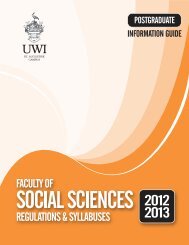Faculty of Humanities and Education (Postgraduate) - The University ...
Faculty of Humanities and Education (Postgraduate) - The University ...
Faculty of Humanities and Education (Postgraduate) - The University ...
You also want an ePaper? Increase the reach of your titles
YUMPU automatically turns print PDFs into web optimized ePapers that Google loves.
122<br />
POSTGRADUATE REGULATIONS & SYLLABUSES 2012 - 2013<br />
THE FACULTY OF HUMANITIES & EDUCATION<br />
ASSESSMENT<br />
Rationale for assessment<br />
<strong>The</strong> programme focuses on higher-order skills <strong>and</strong> authentic<br />
assessment. <strong>The</strong>refore, traditional testing is not recommended.<br />
<strong>The</strong> emphasis, instead, will be on enhancing the analytical,<br />
writing, <strong>and</strong> presentation skills <strong>of</strong> participants. Individual work<br />
is important to help promote the assessment philosophy <strong>of</strong><br />
accountability <strong>and</strong> transparency. Group work is also advocated,<br />
since it reinforces the m<strong>and</strong>ate <strong>of</strong> the present millennium for<br />
working in teams. Indeed, the new collaborative management<br />
thrust dem<strong>and</strong>s meaningful team interaction. Finally reflective<br />
practice as a component <strong>of</strong> assessment is indispensable.<br />
Participants must be made to recognize that the main purpose<br />
<strong>of</strong> the programme is to have them improve their practice<br />
<strong>and</strong> to align it with the aims <strong>of</strong> education m<strong>and</strong>ated by the<br />
environment <strong>of</strong> this age <strong>of</strong> information <strong>and</strong> communication.<br />
Individual assignment – 40% <strong>of</strong> marks<br />
Group assignments – 20% <strong>of</strong> marks, to be submitted one week<br />
after the completion <strong>of</strong> each module<br />
Technology group assignment – 10% <strong>of</strong> marks<br />
Reflective practice – 30% <strong>of</strong> marks<br />
YEAR:<br />
SEMESTER:<br />
COURSE CODE: EDEA 6118<br />
COURSE TITLE: EDUCATIONAL LEADERSHIP<br />
NUMBER OF CREDITS: 8<br />
COURSE DESCRIPTION:<br />
Overview<br />
<strong>The</strong> majority <strong>of</strong> educational scholars <strong>and</strong> practitioners are<br />
convinced that leadership is the most potent factor in the<br />
delivery <strong>of</strong> high-quality education. It is argued that managerial<br />
skills are important for certain technical requirements <strong>of</strong> the<br />
tasks in educational administration, but leadership provides<br />
the sources <strong>of</strong> power, influences, motivations, <strong>and</strong> synergies to<br />
achieve the goals <strong>of</strong> education. Leadership is the most essential<br />
cohesive force that holds organizations together. <strong>Education</strong> itself<br />
is not a clear area <strong>of</strong> endeavour. Its goals are <strong>of</strong>ten ambiguous,<br />
vague, amorphous, etc., <strong>and</strong> its methods <strong>and</strong> technologies are<br />
equally inexact with respect to the delivery <strong>of</strong> the stated goals.<br />
Leadership has therefore to be possessed <strong>of</strong> underst<strong>and</strong>ings<br />
<strong>and</strong> skills that benefit a human enterprise that is characterized<br />
by perennial inherent uncertainties in the face <strong>of</strong> turbulent<br />
environments. This is obviously a critical course since the<br />
underst<strong>and</strong>ings underlying the design <strong>and</strong> delivery pervading<br />
this programme are geared to encompass a comprehensive<br />
range <strong>of</strong> educational leadership functions <strong>and</strong> tasks.<br />
OBJECTIVES<br />
Students will:<br />
1. underst<strong>and</strong> the theories <strong>and</strong> concepts underlying leadership<br />
generally, <strong>and</strong> educational leadership specifically;<br />
2. justify the centrality <strong>of</strong> leadership in education;<br />
3. differentiate between leadership <strong>and</strong> management<br />
4. make judgements about the role <strong>of</strong> leadership in<br />
education;<br />
5. assess the need for leadership in the delivery <strong>of</strong> quality<br />
education;<br />
6. evaluate the need for leadership in developing <strong>and</strong><br />
sustaining positive school cultures;<br />
7. compute the relationships between leadership in schools<br />
<strong>and</strong> the need for unity in a democratic, multicultural<br />
society.<br />
CONTENT<br />
• <strong>The</strong>ories <strong>of</strong> <strong>and</strong> approaches to leadership trait,behavioural,<br />
situational, contingency<br />
• Power <strong>and</strong> leadership underst<strong>and</strong>ing <strong>of</strong> the bases <strong>of</strong> power<br />
expert, rational/legal authority, coercive, reward, culture,<br />
charismatic, etc.; the use <strong>of</strong> power <strong>and</strong> group dynamics<br />
• <strong>Education</strong>al <strong>and</strong> instructional leadership educational<br />
<strong>and</strong> curriculum designs <strong>and</strong> forms <strong>of</strong> educational <strong>and</strong><br />
instructional leadership<br />
• Transformational leadership entrepreneurship in human<br />
enterprises, proactive vs. reactive leadership, vision, change<br />
<strong>and</strong> change processes, policy reforms <strong>and</strong> implementation<br />
• Multicultural leadership theories <strong>and</strong> concepts relating<br />
to multicultural, multiethnic, plural, or diverse societies;<br />
issues relating to forms <strong>of</strong> discrimination, alienation,<br />
marginalization, deprivation, etc.; Leader as ‘centrist’ <strong>and</strong><br />
‘divisivist’ in a plural society<br />
• Reflections on concepts <strong>of</strong> equity, equality, human rights,<br />
freedom, responsibilities, etc., toward community <strong>and</strong><br />
nation-building<br />
• School/community leadership the boundary-spanning<br />
activities <strong>of</strong> leaders; community/public relations;<br />
developing constituencies or communities <strong>of</strong> support<br />
within <strong>and</strong> outside the school as linkages to educational<br />
success, community, <strong>and</strong> nation-building<br />
Methods <strong>of</strong> Delivery<br />
Lectures<br />
Small- <strong>and</strong> large-group discussions<br />
Role-play <strong>and</strong> simulations<br />
Audio-visual materials<br />
Sensitivity training<br />
Case analysis<br />
Problem-solving<br />
ASSESSMENT<br />
Students will be assessed on the basis <strong>of</strong> written papers. All<br />
papers will test the students’ underst<strong>and</strong>ings <strong>of</strong> <strong>and</strong> abilities to<br />
apply theories <strong>and</strong> concepts, while exhibiting skills <strong>and</strong> creativity<br />
in attacking real-life problems in the school situation.

















